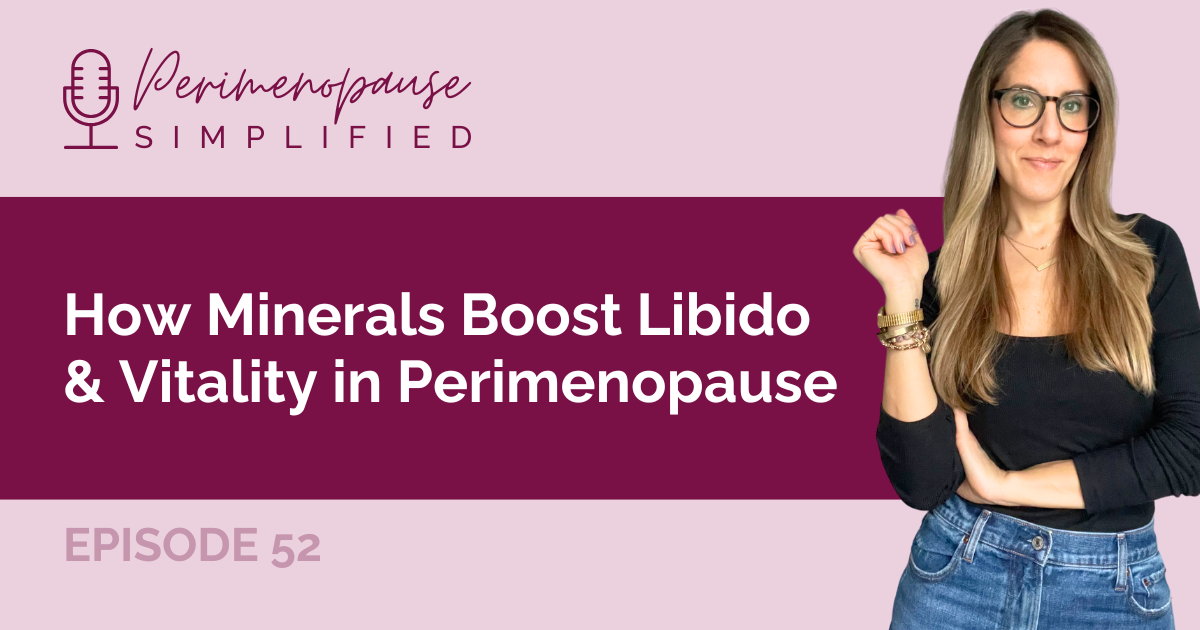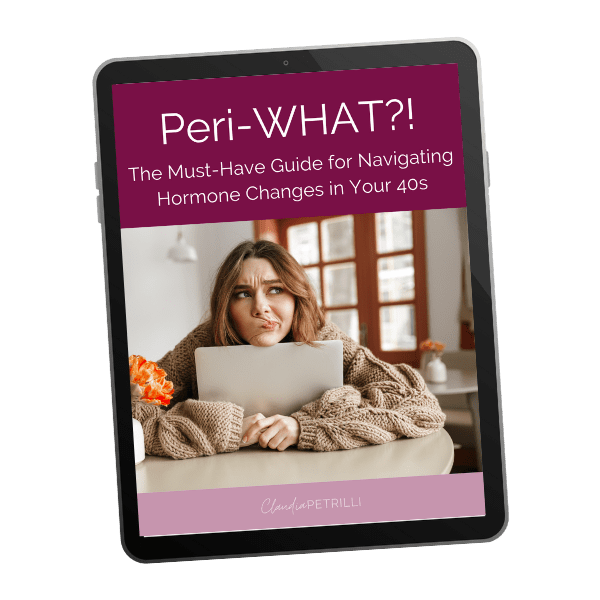
52. How Minerals Boost Libido & Vitality in Perimenopause
Don’t Miss An Episode!
In this episode, Claudia discusses how minerals are the “spark plugs of life” and may be the missing piece in addressing your perimenopause symptoms. Whether you’re dealing with fatigue, mood swings, anxiety, joint pain, sleep disruption or low libido, you’ll want to listen to this episode.
In this episode, we covered:
- What happens to your minerals in perimenopause
- Key minerals that play a role in your energy, mood, and libido
- The little known mineral and hormone connection
- How Hair Tissue Mineral Analysis (HTMA) can help you in perimenopause
- What mineral imbalances tell us on a deeper, emotional level
Ready to Ignite Your Libido? Grab my LIMITED-TIME OFFER HERE, which includes my Ignite Your Libido course + Hair Tissue Mineral Analysis (HTMA) test + to address micronutrient imbalances, so you can revamp your energy, vitality & libido!
Why Minerals Matter in Perimenopause
Hey, welcome back to the show! Today, we’re tackling a topic that might not sound sexy at first—but trust me, it’s one of the most important conversations we can have about your health in perimenopause: minerals.
The Role of Minerals in Your Health
Minerals are known as the “spark plugs of life” because they fuel your energy, mood, digestion, stress resilience, and even your libido. They are the building blocks of your body’s chemistry.
If you’re feeling like your spark is gone, like you’re dragging through the day with no energy left for connection or intimacy, this episode is for you.
Why Perimenopause Increases Mineral Demand
When you’re in perimenopause, your body’s demand for minerals skyrockets. All those hormone fluctuations create stress on your body. You’re burning through minerals faster than you can replenish them. And when your mineral levels are imbalanced, you feel it—whether it’s in the form of fatigue, mood swings, trouble sleeping, or your libido.
Libido and Vitality: More Than Just Hormones
Your libido is a reflection of your overall vitality. It’s not just about hormones—it’s about how well your body is functioning at a foundational level. And that’s where minerals come in.
Key Minerals for Energy, Mood, and Libido
Magnesium: The Relaxation Mineral
Magnesium helps your body relax and supports progesterone production, your calming, feel-good hormone. When magnesium is low, you might feel stressed or anxious, which can make intimacy the last thing on your mind.
Sodium & Potassium: Hydration, Energy, and Stress Balance
Sodium and potassium regulate hydration, energy, and your stress response. If sodium is too high relative to potassium, your body is in fight-or-flight mode, pumping out cortisol. Too much cortisol suppresses sex hormones, leaving you feeling disconnected and drained.
Zinc: Supporting Testosterone and Desire
Zinc supports testosterone production, which fuels desire and vitality. Low testosterone can show up as fatigue, low libido, and a lack of drive. (Go back to my testosterone episode earlier this month to learn why we need it as women!)
Calcium: Muscle and Nerve Function
Calcium promotes muscular and nerve function, including those involved in physical intimacy.
Copper and Estrogen Balance
Copper and estrogen have a relationship, so balancing it with zinc can support healthier estrogen levels, improving your mood and desire.
Minerals Work Together
But minerals don’t work in isolation. They interact with each other and influence key systems in your body, including your hormones, stress response, and detox pathways.
HTMA: A Deeper Look at Your Mineral Health
By using HTMA (hair tissue mineral analysis), we can connect the dots between your mineral levels, hormonal health, and symptoms—and create a personalized plan to address the root causes. Blood tests only show what’s happening in the moment, but HTMA gives us a three-month snapshot of how your body is handling minerals as well as detoxing heavy metals.
Special Offer: Ignite Your Libido + HTMA Package
For the month of February, you can get my mini course Ignite Your Libido + an HTMA testing package to address mineral imbalances and get a personalized plan.
HTMA isn’t just about checking for mineral deficiencies—it’s about understanding how your body is coping with stress, how your hormones are functioning, and if heavy metals are impacting your mineral balance. With HTMA, we can:
- Assess your stress response
- Identify imbalances that impact your mood, energy, and libido
- Support safe detoxification to remove toxic heavy metals
Check it out here: Ignite Your Libido
What Mineral Imbalances Say About Your Emotional Health
One of my favorite parts of mineral imbalances is what they might be trying to tell you on a deeper, emotional level. As I share these, see if anything I’m saying resonates for you and how it may be affecting your intimacy and connection with your partner.
Calcium: Boundaries and Protection
- High calcium? You might be building walls to protect yourself.
- Low calcium? You may struggle to feel supported or to stand your ground.
Magnesium: Relaxation and Trust
- Low magnesium can indicate holding onto stress or fear, making it harder to let go and connect.
Potassium: Connection and Expression
- Low potassium? You might be feeling disconnected or struggling to express your needs.
- High potassium? This could indicate hyper-reactivity or living in a heightened state of stress.
Sodium: Vitality and Burnout
- Low sodium reflects burnout.
- High sodium signals overstimulation or overwhelm.
Copper: Feminine Energy and Creativity
- High copper can correlate with emotional overwhelm or unresolved trauma.
- Low copper suggests a creative or intuitive block.
Zinc: Stability and Boundaries
- Low zinc might mean difficulty setting boundaries.
- High zinc can reflect defensiveness or emotional withdrawal.
Your Minerals Matter for Your Well-Being
Lots of food for thought, right? If you’ve been struggling with stubborn symptoms like fatigue, anxiety, and feeling disconnected from your body or your partner, your minerals could be playing a big role.
HTMA helps us address physical imbalances but also helps us uncover deeper emotional patterns that could be holding you back. When we don’t address resentments, anger, frustration, or feel safe to communicate our needs to our partner, it can block us from true connection.
Until next time!
Claudia Petrilli is a Functional Health Coach, Integrative Nutrition Coach, Women’s Health Educator, and creator of The Hormone Rescue program. Having experienced debilitating periods, digestive issues, a sluggish thyroid, a pituitary tumor, and perimenopause symptoms in her late 30s, she knows exactly what it’s like to get dismissed by doctors and spend years searching for answers.
Free Resources:
Peri-What?! The Must-Have Guide for Navigating Hormone Changes in Your 40s
Course:
Programs:
Connect with Claudia:
Have a question or episode topic suggestion? Please email: claudia@claudiapetrilli.com.
Love the show? Please subscribe, leave a 5-star rating, review, and share with others, so more women can find this podcast for guidance and support through their perimenopause journey!






